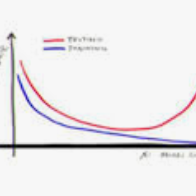There has long been plenty of theoretical and empirical evidence supporting the success of ensemble learning. Deep ensembles in particular take advantage of training randomness and expressivity of individual neural networks to gain prediction diversity, ultimately leading to better generalization, robustness and uncertainty estimation. In respect of generalization, it is found that pursuing wider local minima result in models being more robust to shifts between training and testing sets. A natural research question arises out of these two approaches as to whether a boost in generalization ability can be achieved if ensemble learning and loss sharpness minimization are integrated. Our work investigates this connection and proposes DASH - a learning algorithm that promotes diversity and flatness within deep ensembles. More concretely, DASH encourages base learners to move divergently towards low-loss regions of minimal sharpness. We provide a theoretical backbone for our method along with extensive empirical evidence demonstrating an improvement in ensemble generalizability.
翻译:暂无翻译



